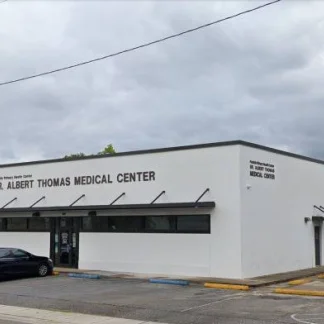Gulf Coast Veterans Health Care System - Mobile
Gulf Coast Veterans Health Care System - Mobile is a public clinic located in Mo...
Franklin Primary Health Center, located in Mobile, Alabama, provides behavioral health care and alcohol and drug rehab services to individuals from all walks of life. The Center strives to make treatment affordable to all individuals.
At Franklin Primary Health Center, priority is given to those living with HIV, those who are using needles, and pregnant women. Services are provided on an outpatient basis.
The outpatient program is for individuals who need addiction treatment or dual diagnosis treatment. Clients work with a mental health counselor to receive support. Individual therapy, group therapy, and family therapy are available. Clients also have access to case management services and referrals to community resources to address unmet needs. Self-help groups and referrals for medical treatment are also provided.
Contact us for more information: (251) 434-8195

Connect with Franklin Primary Health Center by calling their admissions team directly.
(251) 434-8195 Website Get DirectionsResearch clearly demonstrates that recovery is far more successful and sustainable when loved ones like family members participate in rehab and substance abuse treatment. Genetic factors may be at play when it comes to drug and alcohol addiction, as well as mental health issues. Family dynamics often play a critical role in addiction triggers, and if properly educated, family members can be a strong source of support when it comes to rehabilitation.
Group therapy is any therapeutic work that happens in a group (not one-on-one). There are a number of different group therapy modalities, including support groups, experiential therapy, psycho-education, and more. Group therapy involves treatment as well as processing interaction between group members.
Trauma therapy addresses traumatic incidents from a client's past that are likely affecting their present-day experience. Trauma is often one of the primary triggers and potential causes of addiction, and can stem from child sexual abuse, domestic violence, having a parent with a mental illness, losing one or both parents at a young age, teenage or adult sexual assault, or any number of other factors. The purpose of trauma therapy is to allow a patient to process trauma and move through and past it, with the help of trained and compassionate mental health professionals.
Group therapy is any therapeutic work that happens in a group (not one-on-one). There are a number of different group therapy modalities, including support groups, experiential therapy, psycho-education, and more. Group therapy involves treatment as well as processing interaction between group members.
Trauma therapy addresses traumatic incidents from a client's past that are likely affecting their present-day experience. Trauma is often one of the primary triggers and potential causes of addiction, and can stem from child sexual abuse, domestic violence, having a parent with a mental illness, losing one or both parents at a young age, teenage or adult sexual assault, or any number of other factors. The purpose of trauma therapy is to allow a patient to process trauma and move through and past it, with the help of trained and compassionate mental health professionals.
Trauma therapy addresses traumatic incidents from a client's past that are likely affecting their present-day experience. Trauma is often one of the primary triggers and potential causes of addiction, and can stem from child sexual abuse, domestic violence, having a parent with a mental illness, losing one or both parents at a young age, teenage or adult sexual assault, or any number of other factors. The purpose of trauma therapy is to allow a patient to process trauma and move through and past it, with the help of trained and compassionate mental health professionals.
Gulf Coast Veterans Health Care System - Mobile is a public clinic located in Mo...
Alano Club is a drug and alcohol rehab and support organization in Mobile, Alaba...
Clean and Sober Recovery Homes is a private rehab located in Mobile, Alabama. Cl...
AltaPointe – Outpatient Services – Mobile is a drug and alcohol rehab in Mobile,...